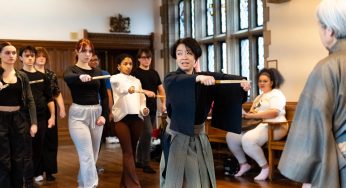Editorial: Use libraries’ resources; embrace changes in library systems
An article in The New York Times says that libraries are working to become more suitable and sociable “third places” in society — centers of communities between home and either work or school. Especially considering the decline of traditional bookstores, many public libraries are working to become places where people can go to access information and resources in a way that is friendly to those who are more familiar with an iPad than the Dewey Decimal System.
It’s not a new concept for libraries to be central parts of communities, providing valuable resources. But many public libraries are stepping it up to become more inviting places, with additions such as comfier couches and armchairs, vending machines and coffee. One library in suburban Illinois has 36 copies of the best-seller “Fifty Shades of Grey” to meet popular demand.
Modern public libraries developed to democratize knowledge, but that role has mostly been taken over by our friendly neighborhood librarians: Wikipedia and Google — at least for the 50-and-under crowd.
However, as anyone who has ever gone to “Club Hillman” will attest, libraries aren’t obsolete — and those who have wandered across Schenley Plaza to the (admittedly much more aesthetically pleasing) Carnegie Library understand that public libraries are especially important.
As Pitt students, we’re privileged to have two major libraries literally facing each other, and more Pitt students should venture across that grassy square, get a library card and use it. While going to the library to study can be efficient and convenient (and even pleasant — Carnegie Library has a cafe and a bamboo garden, and Hillman has … a lot of windows), libraries are more than just places to do group projects late at night. They organize and provide numerous groups and classes, including poetry reading series, beginning foreign language classes and one-on-one help with resumés and cover letters — for free.
While most of us are able to access similar resources at Pitt (by taking certain classes, or by seeking advice from the Career Services office or from an academic adviser), it’s important that everyone knows how to access these services once they’ve left Pitt. The Office of Career Services does provide appointments for free to alumni within one year of graduation — and also after that, for a fee — but that might not be convenient for people who no longer live in Pittsburgh.
While students might find that Hillman is best for specific research because of its late operating hours and wide access to online academic journals, a library card at Carnegie Library can give more access to music, DVDs and best-sellers. Libraries are models of sustainability that work. They’re an alternative to spending a lot of money at a bookstore or downloading e-books and music from the Internet.
Libraries aren’t obsolete, so this semester, take advantage of all the library resources offered at both our University and in our city — and don’t forget to keep an eye out for ways to care for and support both library systems when you can.
Recent Posts
Photo: Fetterman Protest
Attendees gathered in Schenley Plaza to protest Sen. John Fetterman, D-Pa., on Saturday, March 29.…
Photos: Pitt Women’s Soccer v. Youngstown State
Pitt women’s soccer competes against Youngstown State at Ambrose Urbanic Field on Saturday, March 29.…
Photos: Noh Movement and Chant Workshop
Students attend a Noh Movement and Chant Workshop led by professional Noh performers Hisa and…
‘He’s off to a much faster and better start’: Republicans reflect the second Trump administration’s first two months
Since Inauguration Day Trump’s second term has caused division amongst young Americans. Despite these controversies,…
Who Asked? // Why do we accept bad treatment from people?
This installment of Who Asked? by staff writer Brynn Murawski attempts to untangle the complicated…
What, Like It’s Hard? // Lean on your people
Contributing editor Livia LaMarca talks about leaning on your support networks and gives advice on…




